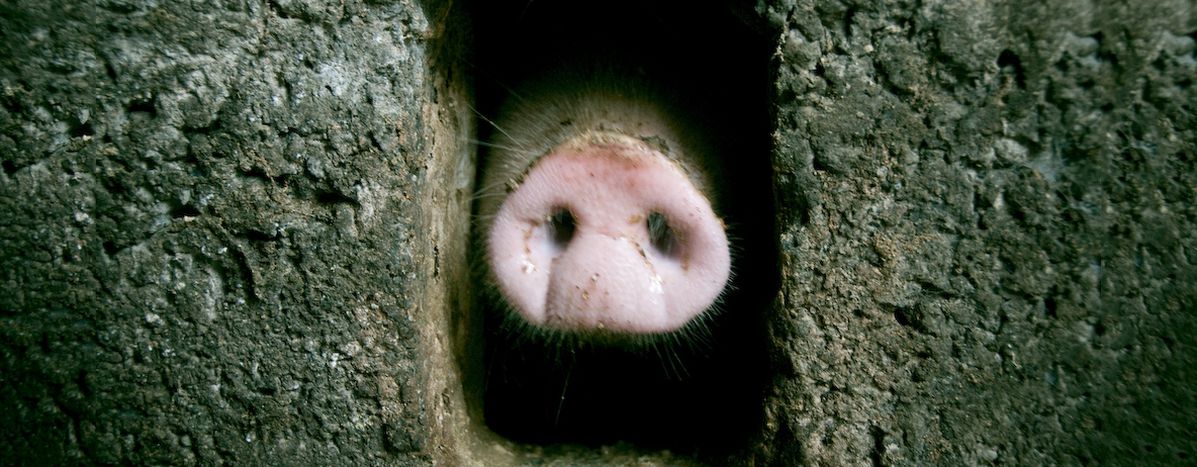
PIIGS: because the European Union is not a slaughterhouse
Published on
Translation by:
 Adele Benlahouar
Adele Benlahouar
What does it really happen in Europe after the crisis of 2008? What have been the consequences of the European Union politics on the countries which are on the Mediterranean sea? Three italian directors try to answer these questions talking about unconventional truths.
PIIGS-Or how I learned to worry about and to fight the austerity is the indipendent documentary realized by three Italian directors Adriano Cutraro, Federico Greco and Mirko Melchiorre. The movie is coming out the on the next 27th of April.
The title which is captivating and instigator, refers to the much suffering European countries after the crisis of 2008 (PIIGS is the acronym for Portugal, Ireland, Italy, Greece and Spain). The acronym is pejorative and recalls intentionally the english word “pigs”, because it highlights how much these European countries are actually the less vituous of the Union and they themselves harm the all system.
“We shot this documentary on which we’ve worked hard with body and soul for more than 5 years- says Federico- to convey a meaningful messagge: it is possible a different way of making politics, a system based on the real economy,a system that doesn’t make compromises with lobby and the big investment banks. It’s up to us realise that it’s possible to change the course”. The film is a real challenge to the economic thought that dominates in Europe. There’s who struggle, who fully commits to show that a different Europe is possible and it’s described in the documentary through interviews and images that proves the difficulties that common European citizens have to tackle everyday.
Well-known personalities from the economic and literary field, participated to the project; from the philosopher and linguist Noam Chomsky to the Greek Minister of Finance Varoufakis, to Stephanie Kelton economic consultant of Bernie Sanders, up to the the Italian writer Erri De Luca.
But the documentary involves also small actors as the workers of the little (but big) Cooperativa Sociale di Monterotondo (Social Cooperative of Monterotondo in Rome) that takes care of the safeguard and the employment opportunities of disabled people. “We’ve chosen a reality that could be universal-specify the directors- because the Cooperativa Il Pungiglione’s experience is the same lived by many other realities all around Europe. Cinema is a means of communication that creates connections, and we want that our documentary does the same too”. The cooperative is a virtuous example in the field of supplying welfare state services; it is far away from power games, local mafias but it’s relatively finanacially supported. In fact, as many other companies or European associations, the Cooperativa Sociale di Monterotondo can’t support itself and although it has an annual turnover of 2 millions of euros, it can’t solve the budget problems that weigh on it.
In fact, with the crisis of 2008 the government of the countries do not respect the austerity’s parameters dictated by the European Union (the relation between debt and the GDP does not exceed the 60% and the relation between budget deficit and GDP is less than 3% per year). They’re forced to cut out the funds earmarked to the public health, the education and social assistance, delegating these services to private bodies.
“The documentary is an unconventional report of the administrative mismanagement at European and national level –says the directors- it’s not conventional because it counterposes to the informations offered by the traditional medias that omits often truths which are troubling for the system”.
PIIGS is a journey through the Europe of contraddictions, the Europe that wants to repair the damage caused to the real economy made of women and men who face tangible financial and occupational problems everyday and who can’t be supported adequately by a political system that safeguards their necessities.
“Is it really possible the existence of such a close link between the topside and the little rooms of everyday problems?- narrates the the film voiceover, Claudio Santamaria who won the David di Donatello in 2016 for the film They call me Jeeg Robot- is it true that we’re 100 dogs in a room with only 95 bones? And who decides that the bones have to be 95 an not 100?”. In a two-speed Europe, culture has a fondamental role; and that’s exactly through a cultural product “blowing up as a media bomb” that the three filmamakers want to drop on the European context to wake up the consciences and to encourage reflections and discussions.
With an unscupulous story and a delirious editing, the docufilm PIIGS tries to clarify through a simple language, but really acute, what is happening to our economy and to our pocket, without our knowledge.
Crisis is a hot topic that interests and will interest each one of us for the next years . Even though we’re not able to find a solution immediately, we’re not powerless, on the contrary we could work all together trying to find some solutions. The documentary doesn’t give solutions to the crisis but it would be possible through research and through the awareness of consciences maybe creating a connection to solve the evils that affect the Mediterranean sea: the so-called sustainable growth that would aspire no more to the satisfying of the austerity’s measures but it would take care of the citizen and environment welfare.
“We don’t feel like pigs and we can’t look forward to show it”.
Translated from PIIGS: perchè l'Unione non è un mattatoio


